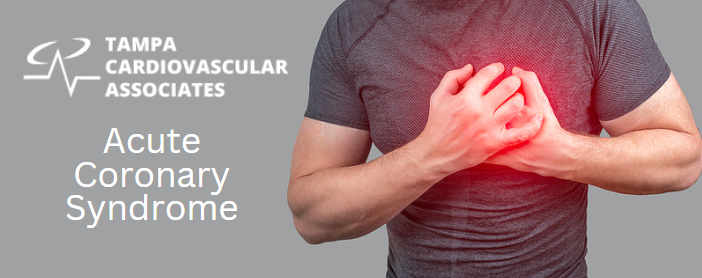Acute Coronary Syndrome, Explained
Posted by: Tampa Cardio
On: December 19, 2022

You may never have heard of Acute Coronary Syndrome (ACS for short), but we are sure you are more familiar with the terms heart attack and unstable angina. These both fall under the umbrella of ACS. It is a blanket term that covers any sudden condition where the heart muscle becomes unexpectedly blocked.
The blockage is almost always due to a blood clot. It comes on suddenly and blocks the blood flow completely. ACS may be caused if a clot forms because of a plaque breakaway, a part of the clot may rupture and clog one of the coronary arteries.
While less common, spasms in the coronary artery can also restrict blood flow. No matter what the cause, it is potentially damaging to the heart and needs to be considered a medical emergency.
The Symptoms
Discomfort or pain in the chest can immediately signal that something’s wrong with the heart. Other symptoms can be confusing and lead to non-action. Take note of these common signs of acute coronary syndrome:
- Chest pain or discomfort, which may involve pressure
- A feeling of tightness or fullness
- Pain or discomfort in one or both arms, neck back, jaw, or stomach
- Shortness of breath
- Feeling light-headed or dizzy
- Sweating
- Feeling Nauseous
Take these symptoms seriously. If you experience chest pain or other symptoms, don’t hesitate to call 911 immediately.
Chest pain caused by ACS can come on suddenly, as is the case with heart attacks. Other times, the pain can be unpredictable or get worse even with rest – both hallmark symptoms of unstable angina. People who experience chronic chest pain resulting from decreased blood flow to the heart due to years of clogging cholesterol residue in their arteries can develop acute coronary syndrome if a blood clot forms on top of the plaque buildup.
The DIAGNOSIS
In order to determine what’s causing your issues, a physician will take a careful medical history and give you a physical examination. If acute coronary syndrome is suspected, further testing will be given, including:
- Blood tests can show if heart cells are dying
- EKG & or ECG measure electrical activity and can diagnose a ACS
If tests show blood flow to the heart is being blocked, your team will work quickly to help restore it. Every second counts to prevent further damage so don’t hesitate to go to the ER or call 911.
Treatment for acute coronary syndrome includes medicine administration and possibly an angioplasty during which doctors will insert and inflate a small balloon to open the artery. A stent (a wire mesh tube) may be permanently placed in the artery to keep it open. In hospitals not equipped to do angioplasty, doctors will administer drugs to dissolve blood clots.
What Puts Someone at Risk for ACS?
Risk factors include
- Smoking
- Uncontrolled High Blood Pressure
- High Cholesterol
- Being Diabetic
- Not Exercising
- Carrying Extra Weight
- History in the family of stroke, heart attack, or heart disease
Your healthcare professional can help you understand your personal risk and what you can do about it.
At Tampa Cardiovascular Associates of Tampa Bay, Florida we recommend taking a proactive approach to cardiovascular health. If you have several risk factors, come see us for a consultation and let us make lifestyle recommendations that can help keep you in the clear.
www.Tampacardio.com | 813-975-2800.
Posted by: Tampa Cardio
On: 19/12/2022
